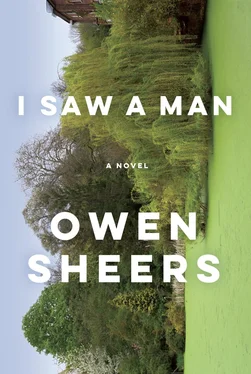So the first Michael knew of Caroline’s choice was when Peter arrived at the cottage a few weeks later. It was late in the afternoon, grey clouds piling above the hills, the River Severn flashing in the distance like a falling coin. Michael was out the back, heaping branches and brambles onto a bonfire. At first he’d mistaken the crackle of tires on the gravel as the sound of the flames. But then he’d heard an engine cut out and the slam of a car door. When he’d come round to the front of the house he was still wearing his gardening gloves, a fistful of blackthorn bunched in one hand. Peter was standing beside the front porch. On hearing Michael’s footsteps he’d turned towards him. The look in his eyes, like that of a child, stopped Michael in his tracks.
Michael had met Peter only a few times before. At a Sightline Christmas party, at some drinks for Caroline’s birthday. There had been a dinner once, too, with him and his wife at their house in Bristol. Michael liked him. He had the easy, dry manner of a man who’d decided to avoid arguments. Not because he couldn’t win them, but because he didn’t want to have to. According to Caroline, if he’d wanted, Peter could have risen high in broadcasting. But he’d chosen to stay at a level that kept him close to the making of programmes instead. “Close,” as he once said to Michael, smiling in resignation, “to the stuff they’re actually about.”
For a long second, as they’d faced each other outside Coed y Bryn that afternoon, neither man had said anything, the gaps in their mutual knowledge growing between them. But then Peter had said his name—“Michael,” and that’s when he’d known. Caroline had chosen Peter. Peter was the man who’d bear her last message, the man who’d come to him across the gravel as he sank to his knees, whose voice would say his name again—“Michael”—and whose hands would come to rest lightly on his shoulders as he buried his face in his gloves, inhaling their scent of wood smoke, the blackthorns scratching at his skin.
THE NELSONS’ HALLWAY was flooded with light, the frosted pane above its front door bright with afternoon sun. As Michael walked its length he passed a series of black-and-white photographs hung on the wall to his right. A couple kissing on a bench in Washington Square; an elderly Chinese man looking into an out-of-frame glare; the skyline of Manhattan, miniature between two leaves in the foreground. To his left, halfway along this line of images, a broad staircase climbed the other floors of the house.
The photographs were taken by Samantha. Beneath them she’d hung framed drawings and paintings by her daughters, garish with primary colour. In the first a palm tree arced out from a yellow beach beside a blue sea. The artist’s name was written in crayon above its jagged green leaves— Lucy, age 4. Next to this was a crooked picture-book house bordered by a scribbled hedge, another darker scribble describing smoke from its chimney— Rachel, age 6. As he walked on Michael passed horses, Mummy and Daddy, a red fire engine, and there, at the end of the wall before the door into the front room, a tall stick man wearing a red T-shirt and brown trousers, his hair a rough patch of yellow and his name written above in blue— Michael.
Pausing at his portrait, Michael turned towards the stairs and listened for movement from the floors above. There was nothing. He glanced at the front door to check it was fully closed, which it was. Perhaps it was simply a mistake. It was a beautiful day, so why would they have stayed inside? Josh had probably taken the girls to fly a kite on Parliament Hill, or to swim at the lido below it. Dealing with both of them on his own, he’d maybe just forgotten to close the back door.
Turning from the stairs, Michael went into the front room. He knew he was cutting it fine. If the screwdriver wasn’t in there, then he’d have to leave without it. The room was lit by three tall windows, buttresses of sunlight falling through their draperies. The furnishings were pale, the carpet oatmeal, the shelves white. It was a cabinet of a room, a display case of a shaped and presented life. Artefacts from around the world, art books, travel guides. An oil painting of the Norfolk coast. Side tables deep with photographs of parents, the girls, Samantha and Josh on their wedding day. An old trunk served as a coffee table at its centre. Standing within this lit order Michael held his dirty hands in front of him, palms up, like a surgeon before an operation.
―
When Josh’s promise of an invitation had arrived, it had brought Michael to a party in this room, which is where he’d first met Samantha and the girls. It was a clear Saturday afternoon in November. A week of strong winds had blown the last leaves from the trees on the Heath. The sky was a high blue, a last gift before winter, the air crisp under it. Michael had been to a fencing lesson that morning, one of his first. As he’d returned across the Heath his breath had steamed before him, his footprints leaving a trail through the frosted grass. The dog walkers were scarved, the joggers wearing gloves. As he’d approached the ponds behind the street he’d noticed most of the weekend swimmers were wearing caps.
It was Samantha who’d answered the door. The folded note Michael had found a few days earlier on the doormat at the bottom of his stairwell had been written by her, too. A confident, flowing hand. His name on the front and a simple message inside— We’re having a party on Saturday. From around 2pm. Do come if you can. Samantha and Josh.
“Oh, hi! Great you could come,” she said. “Come in, come in.”
She wore a long-sleeved red dress, a grey cotton belt tied above the slight swell of her stomach. Michael could tell she didn’t know who he was.
“Michael,” he said, as he stepped inside. “From next door?”
“Yes, of course!” She had an easy, natural smile. “Josh told me all about you.”
Michael offered her the bottle of Sancerre he’d brought.
“Oh, you shouldn’t have,” she said as she took it. “Honestly, no need. Thank you.”
There was a swell of voices in the room behind her, a cacophony of registers and conversations. Leading Michael towards them, Samantha called over the heads of her guests.
“Josh? Josh? Look who’s here.”
“Who?”
Michael recognised his voice from the night he’d moved in. Authority laced with surprise. She touched his arm.
“Oh, God, I’m sorry,” she said, looking genuinely alarmed. “I’m useless with names.”
He reminded her and she called to Josh again. “Michael,” she said, leaning into the crowd, one hand on the door frame. “From next door.”
She turned back to him, flashing another smile. “I’ll just pop this in the fridge. Josh’ll sort you out.”
He watched her walk away. Her blonde hair was up, held by a clasp in the shape of a red flower. Her heels, also red, were sudden and sharp on the kitchen tiles.
“What can I get you?”
Josh’s question arrived with his hand, firm on Michael’s back, guiding him into the room. It was loud with people, more smiles, drinks. Children holding glasses of orange juice in both hands passed between the legs of the adults, or offered bowls of nuts and crisps to the friends of their parents. As Josh led Michael towards a table of bottles and glasses he seemed markedly different from the man who’d looked out at the nighttime Heath a few weeks before, a man on his first drink, not his last.
As Josh poured him a glass of wine, Michael tried to listen to what he was saying. But the room’s activity had caught him unawares. His attention was already scattering in anticipation. He’d been back in London for five weeks now, but he’d yet to open himself to a social occasion like this. His recovery, he’d already learnt, would rely on routine, in avoiding anything that might accentuate the space of Caroline at his side. His memory had become a minefield. He’d never known his body to respond so quickly to thought, or imagined his mind could produce such physical pain, such tears. He was not used to crying, but even now, six months after her death, a thought of Caroline, the shadow of an image, the recall of how she tied up her hair before a shower or dabbed spots of moisturiser on her cheeks, could be enough to make his chest thicken, his breath shallow, and his eyes fill.
Читать дальше











